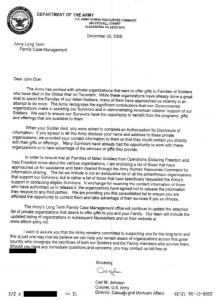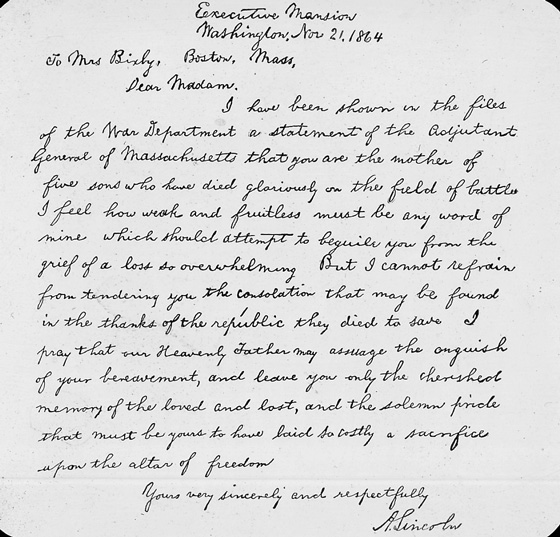In the news yesterday, the U.S. Army apologized for 7,000 letters sent to the surviving families of deceased soldiers who fought in the present Iraq war. Apparently the contracted company suffered a printing problem where the placeholder salutation, “Dear John Doe,” was not properly replaced with the recipients’ names and titles. Ouch. The letters were meant to notify the fallen soldiers’ families of services or gifts they could receive from nonprofit organizations.
(Download the .pdf file hosted by CNN here.)
(On a quick side note, I’m fascinated that they chose to capitalize “Soldier” and “Survivor.” While the move strikes me as archaic, it’s simultaneously respectful for that exact reason.)
I don’t bring up this story to poke fun at the U.S. Army for this mistake — it’s much too sensitive an issue — but I wonder how the recipients must have responded to the letters. The Army has supposedly sent out an apology, but I can’t seem to locate it. You can read their press release here.
I am reminded of two related stories. One is admittedly minor and even silly in comparison, and the second is one that comes with the gravity of history, great loss, and a way with words from an important man.
Related Story #1
On November 5th, 2008, I received an email from JetBlue, the cool, fresh airline I frequented back when I lived near a city it serviced. Now I simply ignore their emails until I move again (from what I could see, they don’t seem to have an easy way to delete one’s account without contacting customer service — very clever). The critic in me, however, can’t help but open these emails to see how companies represent themselves these days, and I certainly had a moment when I opened this particular email.
I am addressed as “Mr. Soandso.” Huh. My mind quickly did a few loops at the time, the first beginning with the technology problem and then ending with questions regarding the company’s views of its customers: (1) obviously an improper or mistakenly forgotten link to the database caused the problem; (2) the placeholder doesn’t sound nearly as cool as JetBlue markets itself; (3) people actually use “soandso” these days? (4) why am I a Mr.? (5) I can’t believe I’m a Mr., especially a Mr. Soandso; (6) what general image must they have of their customers?
Somehow I really got put off at the idea that JetBlue thinks of me as “Mr. Soandso” rather than a “Dear Jetsetter” or even something as innocuous as “Dear JetBlue Customer.” (JetBlue sent out an apology within an hour or more of the error, but it appears I didn’t save the email.) To be honest, I’m really surprised at how much I was bothered over the “Mr.” From what I understand of technology, a placeholder doesn’t need more than a single character to tell the software where to insert the proper data. Adding the gendered title, if I’m correct, would be unnecessary. In my mind, then, it really says something about who the heads of the company think they’re servicing.
A quick aside: I’m reminded of an old classmate who would write “snazzy title here” at the top of her academic papers when she couldn’t come up with a title. She shrugged and looked a bit embarrassed the first time I noticed it, but I loved the idea and still do. It evoked such a positive feeling about the work: By intending to write a really snazzy title, she meant she intended to write a really snazzy paper as well. How else to get a graduate student pumped about writing a seminar paper?
But if Jetblue thinks I’m simply “Mr. Soandso,” they don’t think I’m snazzy at all. When I imagine the character they construct to represent the target audience of their marketing materials, I can only picture shiny shoes, a suit, and tie. A business man. Am I taking this slip personally? No. But I feel like I’ve been given an accidental glimpse into the company. It’s like taking a peek into a restaurant’s unkempt kitchen and realizing why some people in the business tell us we’re better off not knowing what goes on back there if we want to continue enjoying the luxury of eating out.
Alas, I am making too big a deal about this particular story, but I’m doing so to make a larger point: If I could read so deeply into a human and/or technology failure in a case where nothing more than my ego and consumerism are at stake, I can only imagine (or, honestly, perhaps I can’t) what it must feel like to receive a letter regarding the death of a family member and be addressed so coldly.
Related Story #2
And then I think about one of the best letters of all time, one attributed to Abraham Lincoln nearly hundred and fifty years ago, in which the president addresses the mother of five soldiers who where thought to have been killed during the Civil War. (A print version follows below.)
Executive Mansion,
Washington, Nov. 21, 1864.Dear Madam,
I have been shown in the files of the War Department a statement of the Adjutant General of Massachusetts that you are the mother of five sons who have died gloriously on the field of battle.
I feel how weak and fruitless must be any word of mine which should attempt to beguile you from the grief of a loss so overwhelming. But I cannot refrain from tendering you the consolation that may be found in the thanks of the Republic they died to save.
I pray that our Heavenly Father may assuage the anguish of your bereavement, and leave you only the cherished memory of the loved and lost, and the solemn pride that must be yours to have laid so costly a sacrifice upon the altar of freedom.
Yours, very sincerely and respectfully,
A. Lincoln
The letter and the (now inaccurate) storyline may be familiar to those of you who have seen an adaptation in the film, Saving Private Ryan. How sad to think that such a deep apology was (apparently) promptly destroyed by the receiver, for the mother was sympathetic to the South rather than to the views Lincoln held.
I wonder how the “Dear John Doe” letter was received today — even if it’s not the letter that actually breaks the news — if over a hundred years ago a mother and citizen could so decidedly disregard a personal letter from the President of the United States of America.



